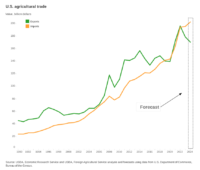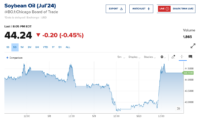Bloomberg's Clarice Couto reported this past Friday that "a surprising tax change in agriculture powerhouse Brazil has the potential to make soy grown in the world’s largest bean exporter less…
Ukraine Grain Talks: Negotiators Face Obstacles From “Mundane,” to “Mission Impossible”
New York Times writer Matina Stevis-Gridneff reported today that, “Russian and Ukrainian negotiators are scheduled to meet Wednesday in Istanbul, in the increasingly desperate effort to release huge amounts of grain from Ukraine’s ports and ship it to a world facing rising hunger.
“Officials have tried for months to break the impasse without triggering an escalation in the war or, worse, a direct confrontation between Russia and NATO.
Wednesday’s meeting raises hopes for a breakthrough, but in interviews, more than half a dozen officials directly involved or briefed on the plans cited obstacles ranging from the mundane to the downright ‘Mission Impossible.’
The Times article noted that, “Proposed alternatives, moving the grain overland or through the Danube River, have been too slow, cumbersome and small-scale to address the challenge of more than 22 million tons of grain stuck in Odesa and other Black Sea ports that are blockaded by Russian warships.”
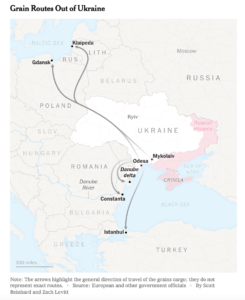
“The urgency is real. Failing to move the grain already at the ports and in silos in the coming weeks will begin to hamper the summer harvest, as farmers will have no place to store their fresh crop.”
Stevis-Gridneff explained that, “A key sticking point so far has been the issue of inspecting the vessels and cargo: the Russian side has demanded that it alone carry out inspections to make sure that the vessels are carrying only grain, and that on return, they are empty, and not taking any weapons back to Ukraine. One diplomat from a U.N. Security Council country said that a compromise was being worked out with Turkish officials carrying out the checks.
“The diplomat, who spoke to reporters on background, said that the proposed agreement includes a Russian guarantee not to fire on the ships. But that promise would apply only to the transportation of grain, and would likely be time-limited, the diplomat said, adding that an agreement could be reached by the end of the week.”
Reuters writer Max Hunder reported yesterday that, “Ahead of scheduled four-way talks in Turkey to unblock Ukraine’s grain exports, Ukraine’s foreign ministry said on Tuesday the grain issue must be resolved under the auspices of the United Nations. ‘Ukraine advocates that the issue of unblocking Ukrainian grain be resolved under the auspices of the U.N.,’ foreign ministry spokesperson Oleg Nikolenko told Reuters.”
Also yesterday, Reuters writer Michelle Nichols reported that, “United Nations Secretary-General Antonio Guterres said on Tuesday that ‘there is still a way to go‘ in talks to try and resume Ukraine Black Sea exports of grain.”
And Reuters writer John Irish reported yesterday that, “France’s foreign minister said on Tuesday she remained cautious about the prospects of four-way talks in Turkey to unblock Ukraine’s grain exports succeeding given Russia had repeatedly added obstacles to achieve such an accord.”
Meanwhile, Reuters writer Elaine Monaghan reported today that, “Ukraine sparked hopes Tuesday for an increase in grain exports despite Russia’s blockade of Black Sea ports, noting that ships had started to pass through an important mouth of the Danube river.
“‘In the last four days, 16 ships have passed through the Bystre rivermouth,’ Deputy Infrastructure Minister Yuriy Vaskov was quoted as a saying in a ministry statement. ‘We plan to maintain this pace.’
“The ministry said the 16 vessels were now waiting to be loaded with Ukrainian grain for export to foreign markets, while more than 90 more vessels were awaiting their turn in Romania’s Sulina canal.”
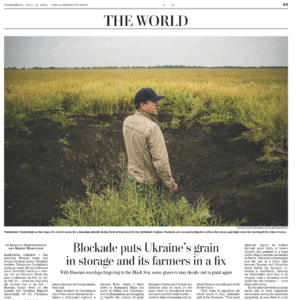
Elsewhere, Isabelle Khurshudyan and Serhiy Morgunov reported in today’s Washington Post that, “Farmers across Ukraine are increasingly feeling the financial strain of Russia’s Black Sea blockade, and the sector’s economic collapse is affecting food security across the world. Ukraine accounted for 10 percent of global wheat exports in 2021, according to the United Nations.
“The high cost of exporting grain via alternate routes — by truck or train to a Western neighbor or on a barge through smaller ports on the Danube River — means farmers are losing money, they said.
“Many farmers are declining to export the current harvest at all — unless a diplomatic solution is reached to unblock the Black Sea ports. Some said they’ll store their grain in silos for now. But with no money coming in, they might not be able to harvest this fall — threatening to dramatically slash the output of one of the world’s largest grain producers for years to come.”
The Post article added that, “Ukraine has worked to improve the other export routes, but they each come with their own headaches. Farmers and government officials said most of the grain is now going out via the Danube River, where it flows down to Romania’s Black Sea ports of Sulina and Constanta. But the Romanians are struggling to handle the volume of grain Ukraine needs to export, which creates costly waits, officials said.”
In production related news, Bloomberg writer Megan Durisin reported yesterday that, “Heat, drought and storms have shrunk the wheat harvest in France, the European Union’s top exporter, further straining global supplies.”
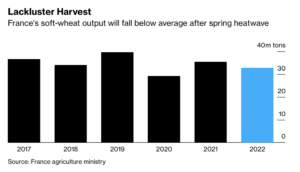
And Elisabetta Povoledo reported in today’s New York Times that, “Every morning at dawn, Roberto Guerrini walks the perimeters of the paddies in northern Italy where his family has grown rice for four generations to ensure that there are no holes — often caused by burrowing animals — in any of the earthen embankments.
“Not a drop of water must be wasted. The drought conditions are so harsh that the government last week declared a state of emergency for much of northern Italy, and there is a growing fear in one of the country’s most fertile regions that things will never be the same.”






